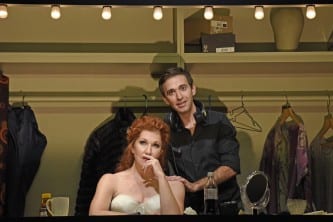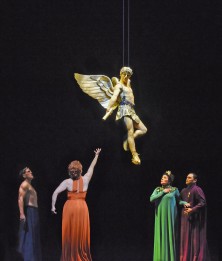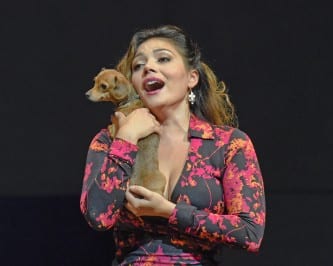
Joyce DiDonato and Anthony Roth Costanzo are the stand-out cast members in ‘Great Scott.’ (Photos by Karen Almond for the Dallas Opera)
Does anybody really care about opera anymore? That’s the existential conundrum posed by several characters in the meta-opera Great Scott, a world premiere — based on an original idea — by composer Jake Heggie and librettist Terrence McNally. When the Super Bowl is watched by millions, what difference does a never-before-seen 18th century Italian bel canto opera mean to the American culture at large really? Why bother?
The brilliant irony, of course, is that the existence of Great Scott answers its own question. A magnificent and glorious creation from the overture until the sweetly understated ending, this is a modern opera that defies expectations. It’s truly a game-changer: An adrenaline injection of life-force into a classic form.

The opera-within-an-opera about the fall of Pompeii.
First in the plus column is its creativity: Even in the heyday from Wagner to Verdi to Puccini, operas were based on preexisting sources — plays, legends, classics. But with its cellphones and contemporary dress and easy vernacular, Great Scott is wholly relatable and repeatedly unexpected. Like an MGM musical from the Golden Age, we meet the main characters backstage before the debut of a long-lost opera about Pompeii from the 1830s. The acclaimed soprano Arden Scott (Joyce DiDonato, who despite a small handful of shaky notes was in fine form and acted brilliantly) has returned to her hometown to present this piece at the struggling American Opera, run by the optimistic impresario Winnie Flato (mezzo Frederica von Stade). Like The Producers, everything seems to go wrong — from the vain Eve-Harrington-ish newcomer (Ailyn Perez, powerful and hilarious) to the tentative romance between the conductor (Kevin Burdette, in a far cry from his work as Beck Weathers in Everest earlier this year) and the fesity stage manager (countertenor Anthony Roth Costanzo) to the bickering tenor and hunky baritone (Rodell Rosel, Michael Mayes) to the bare-assed deux ex machina entrance — until it all goes wonderfully right. Arden finds her purpose, not unlike Princeton in Avenue Q, but with more recitatives.

Ailyn Perez gets laughs and gasps in her comic performance as a vain opera singer.(Photo by Karen Almond)
Great Scott is a solidly-structured comedy, the kind McNally has been crafting for 40 years. There are well-timed jokes (“This shit is hard!” Arden exclaims after performing an especially impressive aria) and finely-drawn personalities (there’s an embarrassingly deep list of interesting supporting characters) and even insights into the artistic temperament that never devolve into navel-gazing. Truly, this is a libretto to be admired for its nimbleness.
At three-and-a-half hours, though, and only one intermish, there must be room to parse and tuck; the fictional opera-within-the-opera Arden performs feels as if it is staged almost in full, and while Heggie’s music astonishingly mirrors true bel canto style, and the staging by Jack O’Brien is amazing, it drags out the metaphors too much. The same is true of Arden’s mystical conversation with the ghost of the composer Bazzetti (Guido Contini’s confrontation with his younger self in Nine accomplishes much the same in one-third the time). But as much as these scene seem to stretch out, it’s almost impossible to imagine where, exactly, to cut any notes from Heggie’s endlessly ravishing score.
World premieres of theater works always have a bit of a “work in progress” feel to them, but despite some quibbles, there’s little to be said badly of Great Scott. It is, simply, one of the most engaging modern operas produced this century. See it, and you’ll talk about it for years.
Great Scott next performs tonight at 7:30 p.m., and again at 7:30 p.m. on Saturday and 2 p.m. on Nov. 15. DallasOpera.org.















